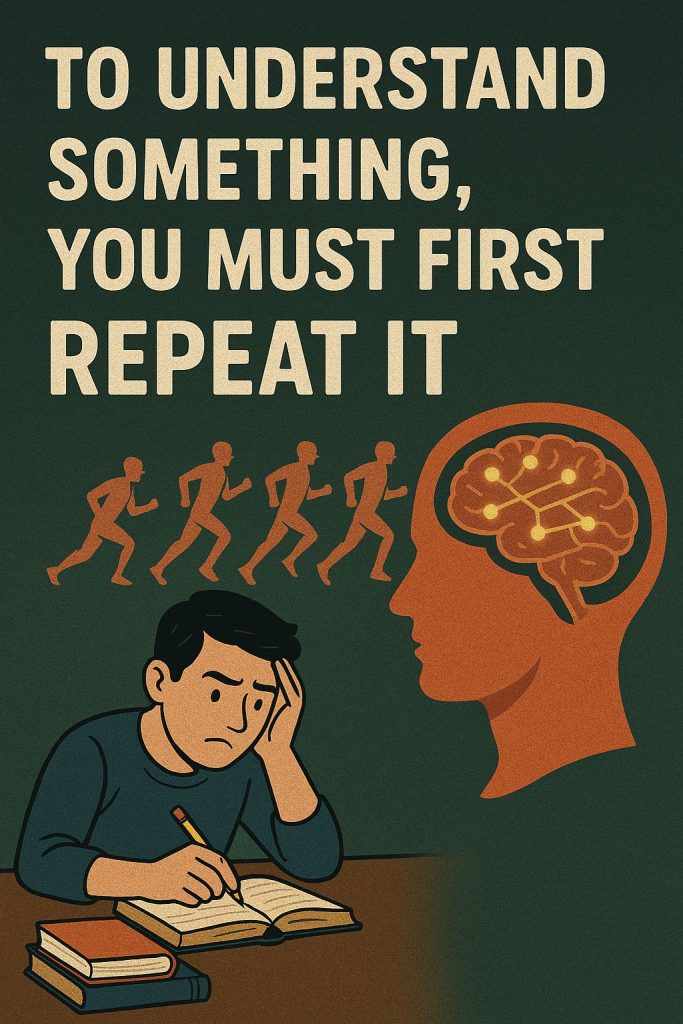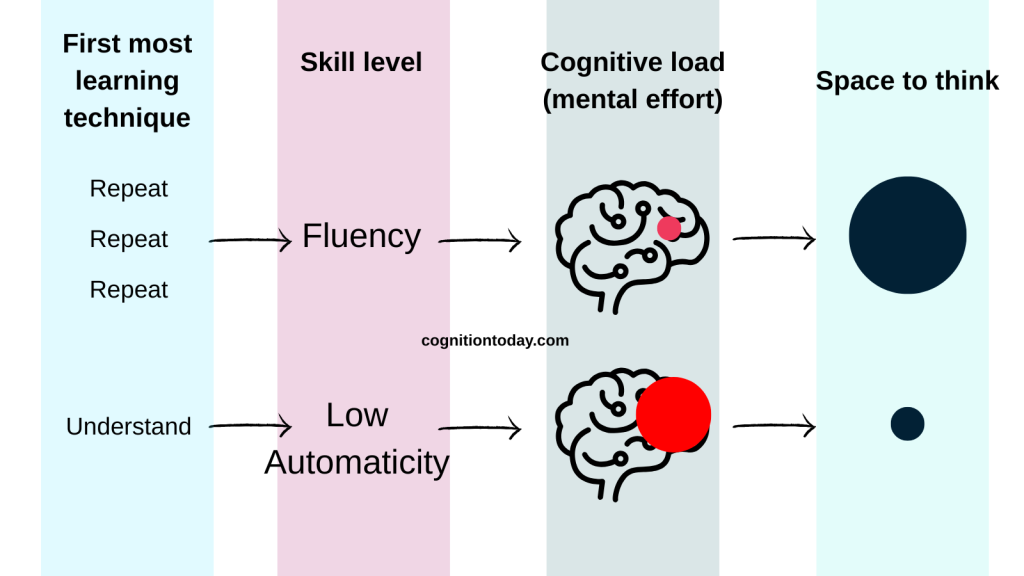If you wish to understand something, you must first repeat it.
This article is a short explanation of how and when students of a new skill get mental space to think and how their basic understanding begins with rote learning. Despite the bad name rote learning gets – memorizing by heart, without a focus on understanding – I’m making the case that rote learning is the first, necessary step before understanding.
At 34, I’m learning like a 5-year-old (context: I’m learning Korean without any knowledge of Chinese roots and was also born in a culture whose languages follow very, very different rules). I want to share something that I see through experience that many experts never see because they rarely start learning from scratch as an adult.
I had a unique experience giving a presentation in a language I barely understand. My task was simple – speak about my daily life in Korea. We students were asked to create a script and get it reviewed before we presented. This activity ensured that the students were at least correct in articulating. Then, it was my moment to present – a whole 5 minutes with a Q&A. Logically, I should’ve stuck to the script reviewed by my teacher. But I went off script right from the get-go, and still, it turned out well.
Why that worked: all those pointless practice repetitions I did during my language class took over my mind, and I unconsciously made new sentences that made sense, even if they were fragments of other sentences recombined.
This learning process (and the creation process) is remixing chunks of knowledge that are ingrained in the mind only because they are repeated and thus automated through rehearsals.
Fleuncy emerges through repetition.
(fluency is also the reason why we often believe lies)

Although my way of life is all about cognitive frameworks, my recent experience is all about repetition in learning, very little cognition, very much just a game of memorizing vocabulary. There really are just 2 minimum requirements to learn a language: Words and Grammar. The words are concepts you learn with images and situations, and the grammar is how those concepts relate to each other to create a specific type of thought.
E.g., I went to a restaurant to eat food (음식을 먹으러 식당에 갔어요). Once the words are introduced, the logic in the sentence is created using rules of grammar. And then, new words can replace words to create similar pattern sentences.
I went to the library to study.
(공부하러 도서관에 갔어요.)
She went to the market to buy vegetables.
(야채를 사러 시장에 갔어요.)
We went to the park to exercise.
(운동하러 공원에 갔어요.)
He went to the café to meet a friend.
(친구를 만나러 카페에 갔어요.)
New words, same logic. This is central to understanding my point. These are templates of thought that can be used with other words. We do a lot of this practice in class, and that saved me when I went off-script.
This is a pattern generalization of that particular type of sentence. Once the pattern is generalized, it is a template that gets used instinctively.
Here’s my observation: When I had my words memorized, I could easily make sentences using the logic learnt in grammar. But when I don’t know the words, my mind doesn’t have enough space to think if I am using the right grammar. It gets stuck while recalling the words, and my brain is fully overclocked and unable to do the extra task of inserting the grammar around the words.
This article is about that workshop in the mind that puts the words and grammar together. Not just words and grammar, but any kind of mental work. Effortless things – like speaking your first language don’t require as much mental space; that’s why it is very easy to talk while doing some other activity, but talking becomes a distraction when a task gets really difficult.
For that, I will introduce 2 concepts:
- Working memory: The component of memory in which information from our senses and information from our long-term memory meets together and we do things to it – like mental math, recalling a list, remembering words and dates, remembering a password while entering it, etc. Human attention goes into the working memory to complete a thinking task.
- Cognitive load: The difficulty of a task based on how much brain power is used to do the task correctly. Walking is a low cognitive load. Recalling words you’ve memorized is low cognitive load. Recalling words you’ve hardly seen before is a high cognitive load.
The space in which we think is Working memory, and the effort needed to do the work is described as the cognitive load of that work.
When you are fluent at something, you experience a very low cognitive load, which by definition doesn’t use the resources in your working memory.
“Understanding” is a more complex process – it involves long-term memory, analysis, shifting attention between multiple concepts, and connecting an idea to a previously learned idea. All of that requires space in working memory. And that space can be dramatically increased if the cognitive load is low. One way to reduce cognitive load is to learn through repetition so the “stuff” you are trying to do in your head uses components that are in your head by instinct.
This has worked out really well in my learning journey – every new grammar I learn, I can use it on words that are embedded in my memory – words like food, studying, home, shopping. When I use such words, the cognitive load of the words is low, so there is space in my working memory to think about the grammar and construct a new sentence.
Conversely, when I learn new words that I’ve never seen before and I’m expected to use a new grammar component with those words, all of my mental space is occupied recalling the words, and I make errors in grammar, or vice versa. There is no place to think when that happens.
That mental space – working memory – is the key to multi-tasking, and it also explains why you can do some tasks well while listening to music and still mess up other tasks listening to the same song.

So, where’s the problem? Why am I saying something so basic?
Now, here’s the thing – I’ve heard adults and even experts saying mindless repetition is a waste and students should focus on understanding. I take issue with that statement. You cannot understand things if you don’t even have the basics memorized.
Here’s my challenge to them:
Learn something new and difficult, and tell me if you are able to understand it without a foundation in mindless repetition.
Never will I ever underestimate the power of repetition in learning.
Sports coaches and artists know this. But why is there resistance for cognitive learning?
Ironically, we say “build muscle memory” for every physical skill – music, painting, driving, cooking, etc, even though muscle memory is in the brain – literally defined as the stability of neural connections that fire, and yet – actual memory – like learning facts or thinking, ignores the muscle.
TLDR
As a fresh learner, your mind is blocked by the newly learned Information, and there isn’t space for thinking. If you want space for thinking, first automate the learning through repetition so thoughts could be thought.

Hey! Thank you for reading; hope you enjoyed the article. I run Cognition Today to capture some of the most fascinating mechanisms that guide our lives. My content here is referenced and featured in NY Times, Forbes, CNET, and Entrepreneur, and many other books & research papers.
I’m am a psychology SME consultant in EdTech with a focus on AI cognition and Behavioral Engineering. I’m affiliated to myelin, an EdTech company in India as well.
I’ve studied at NIMHANS Bangalore (positive psychology), Savitribai Phule Pune University (clinical psychology), Fergusson College (BA psych), and affiliated with IIM Ahmedabad (marketing psychology). I’m currently studying Korean at Seoul National University.
I’m based in Pune, India but living in Seoul, S. Korea. Love Sci-fi, horror media; Love rock, metal, synthwave, and K-pop music; can’t whistle; can play 2 guitars at a time.




























This is a small point but I am SO VERY GRATEFUL that you provide the reference to the article at the end, and having it in APA style is a bonus! Thank you.
Thank you so much! Had to write about this because I see professionals getting carried away by being “anti-rote learning”! Glad you find the reference useful! 😀